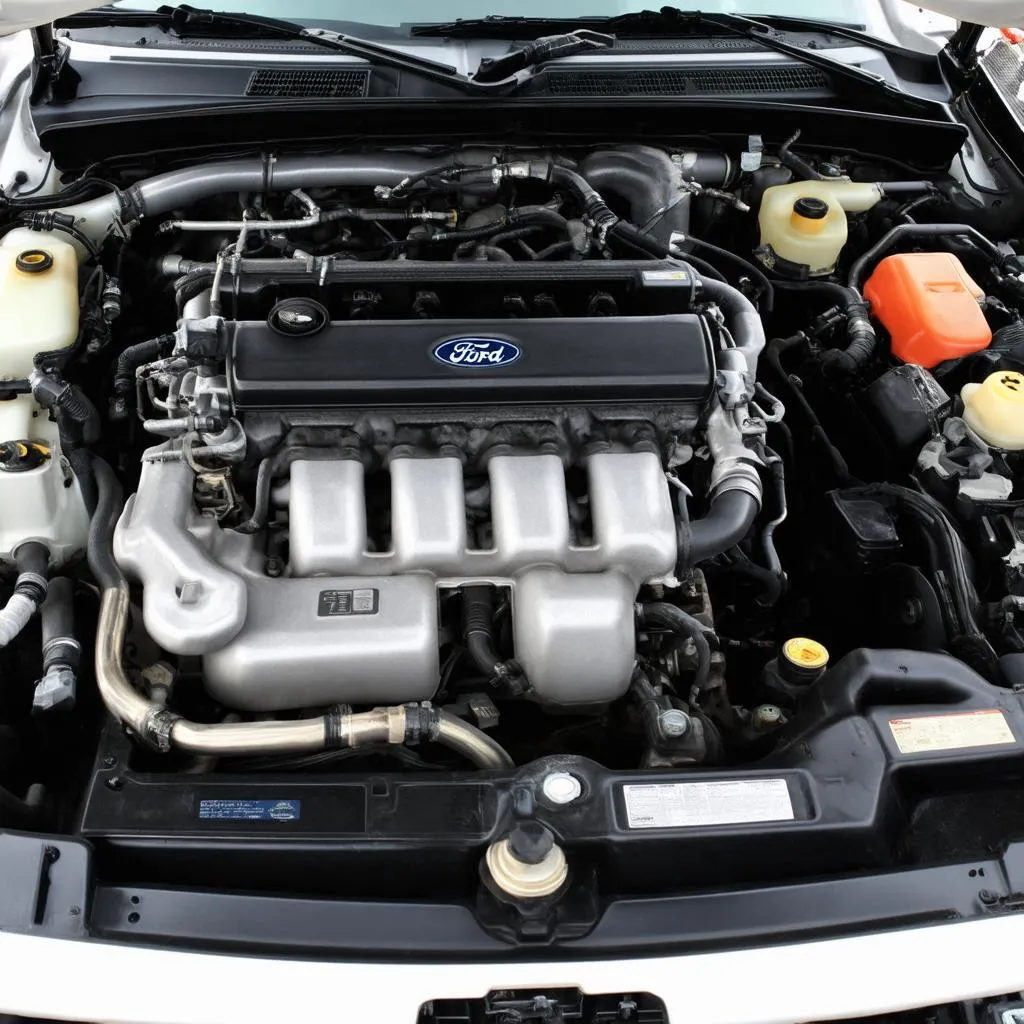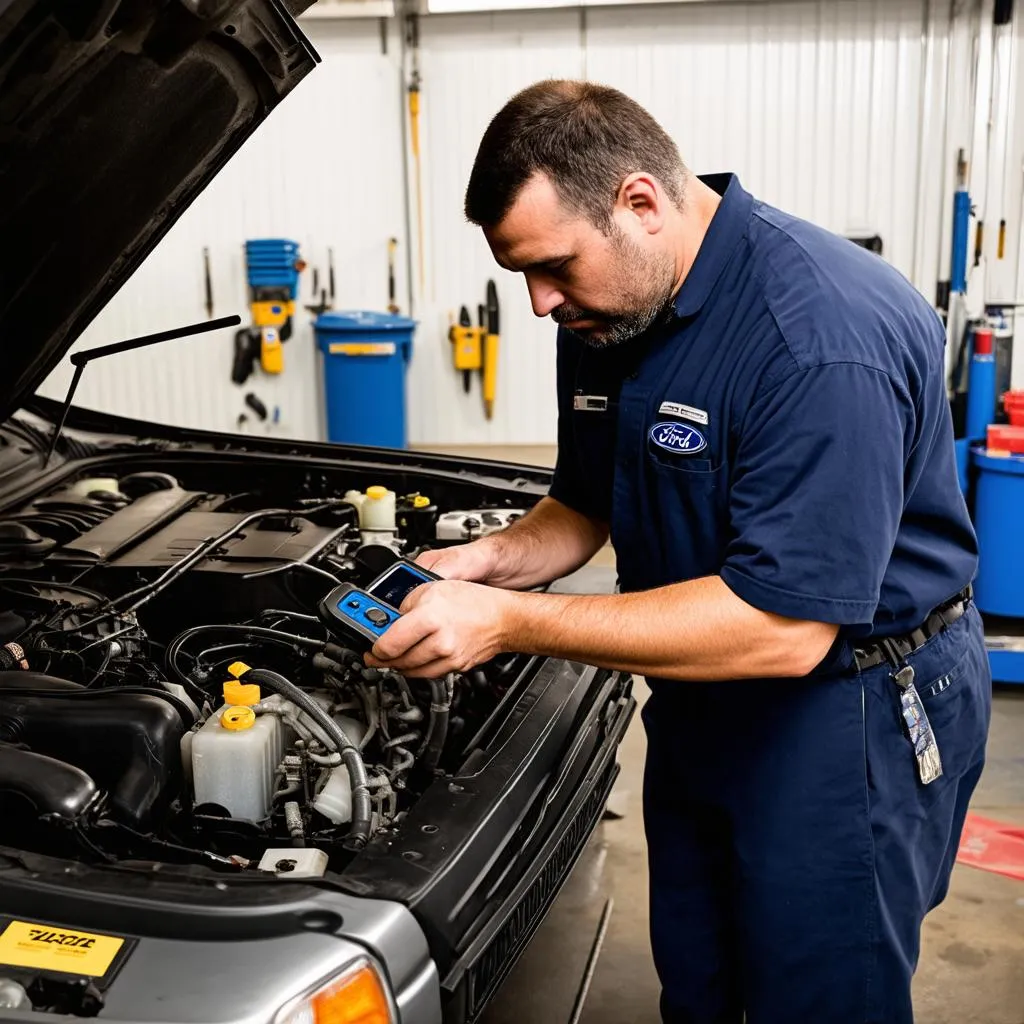Ever had that heart-stopping moment when your trusty 2003 Ford Ranger’s “Check Engine” light decides to make a surprise appearance? You hook up your OBD-II scanner, hoping for a simple fix, only to be greeted by a cryptic combination of numbers: P0316, P0300, and P0325. Talk about a head-scratcher, right?
Fear not, fellow Ranger owner, because in this article, we’ll unravel the mystery behind these engine codes and guide you toward getting your pickup truck back on the road.
What Do These Codes Mean for My 2003 Ford Ranger?
Before we dive into the nitty-gritty, let’s break down these codes into plain English:
- P0300: This code signals a random misfire. Imagine your engine cylinders playing a chaotic symphony instead of working in perfect harmony – that’s essentially what’s happening.
- P0316: This code points to a misfire detected during the first 1000 revolutions after startup. It’s like your Ranger is trying to clear its throat before a big performance, but something’s off-key.
- P0325: This code indicates a problem with the knock sensor circuit on Bank 1 (which, on your 3.0L engine, typically refers to a single sensor for all cylinders). The knock sensor is like the engine’s inner ear, listening for any unusual noises that might signal trouble.
Unraveling the Causes: Why is My Check Engine Light On?
Now that we know what the codes mean, let’s investigate the possible culprits behind their appearance:
1. Spark Plugs and Wires: Worn-out spark plugs or damaged spark plug wires are common culprits behind misfires. Imagine trying to start a campfire with damp wood; that’s similar to what happens when your spark plugs aren’t firing correctly.
2. Ignition Coils: A faulty ignition coil can disrupt the spark delivery, leading to misfires. Think of it as a weak link in a chain reaction, disrupting the engine’s rhythm.
3. Fuel System Issues: A dirty fuel filter, clogged injectors, or a failing fuel pump can starve your engine of fuel, causing it to stumble and misfire. Imagine trying to run a marathon on an empty stomach – your engine needs a steady supply of fuel to perform at its best.
4. Vacuum Leaks: Air leaking into the engine can disrupt the air-fuel mixture, leading to misfires. It’s like trying to bake a cake with too much air in the batter – the results won’t be pretty.
5. Sensors: A faulty crankshaft position sensor or camshaft position sensor can send incorrect signals to the engine control unit (ECU), causing timing issues and misfires. Just like a conductor leading an orchestra, these sensors need to be in sync for the engine to run smoothly.
6. Knock Sensor: A malfunctioning knock sensor or damaged wiring can trigger the P0325 code. It’s like having a broken alarm clock – it won’t be able to alert you when something’s wrong.
Taking Action: Getting Your Ranger Back in Top Shape
Before you start throwing parts at your truck, it’s crucial to diagnose the problem correctly. Start by:
-
Checking for Loose Connections: Ensure all electrical connections to the ignition coils, knock sensor, and other related components are secure.
-
Inspecting Spark Plugs and Wires: If your spark plugs are old or worn, replace them. It’s a relatively inexpensive maintenance task that can prevent major headaches down the road.
-
Testing the Ignition Coils: A multimeter can be used to test the resistance of the ignition coils and identify any faulty units.
-
Examining the Fuel System: Check for a clogged fuel filter, restricted fuel lines, or a weak fuel pump.
-
Inspecting the Vacuum Lines: Look for any cracks, loose connections, or signs of damage in the vacuum lines.
-
Testing the Sensors: If the above checks yield no results, it’s time to test the crankshaft position sensor, camshaft position sensor, and knock sensor using a digital multimeter.
 Ford Ranger Engine
Ford Ranger Engine
Frequently Asked Questions:
Q: Can I still drive my Ranger with these engine codes?
A: While you might be tempted to ignore the check engine light, driving with misfires can damage your catalytic converter and lead to more expensive repairs down the line. It’s best to address the issue sooner rather than later.
Q: Do I need a special scanner to read these codes?
A: Most standard OBD-II scanners can read and clear these codes. However, a professional-grade scanner can provide more detailed information and might be necessary for more complex diagnostics.
Q: Can I fix this myself, or should I take it to a mechanic?
A: If you’re comfortable with basic car maintenance, you can tackle some of the simpler repairs yourself. However, if you’re not comfortable working on your vehicle, it’s always best to consult a trusted mechanic, especially for more complex issues like sensor replacements.
Seeking Expert Guidance for Your 2003 Ford Ranger
Diagnosing and repairing engine issues can sometimes feel like navigating a labyrinth. If you find yourself feeling lost or overwhelmed, remember that you’re not alone!
For expert advice and assistance in diagnosing and repairing your 2003 Ford Ranger 3.0L engine, our team of ASE-certified technicians is just a message away. Contact us via WhatsApp at +84767531508, and we’ll gladly guide you through the process, offering personalized solutions to get your Ranger running smoothly again.
 Mechanic working on Ford Ranger
Mechanic working on Ford Ranger
Beyond the Technical: A Touch of Perspective
In many cultures, vehicles are seen as more than just machines; they’re often viewed as extensions of ourselves, reflecting our personalities and aspirations. Keeping your Ranger in top condition goes beyond just maintenance; it’s about ensuring that your journey continues smoothly and safely.
While we might not have all the answers, we believe in empowering car owners with the knowledge and resources to make informed decisions about their vehicles. After all, a well-maintained vehicle not only performs better but also brings peace of mind and a sense of pride.
This article is just one piece of the puzzle. For a deeper dive into specific repair procedures, check out our other helpful articles on techcarusa.com, including:
- [Replacing Spark Plugs on a Ford Ranger 3.0L Engine]
- [Diagnosing Fuel System Problems]
- [Troubleshooting Vacuum Leaks]
Don’t hesitate to leave a comment below or reach out to us if you have any questions or need further assistance. Safe travels!